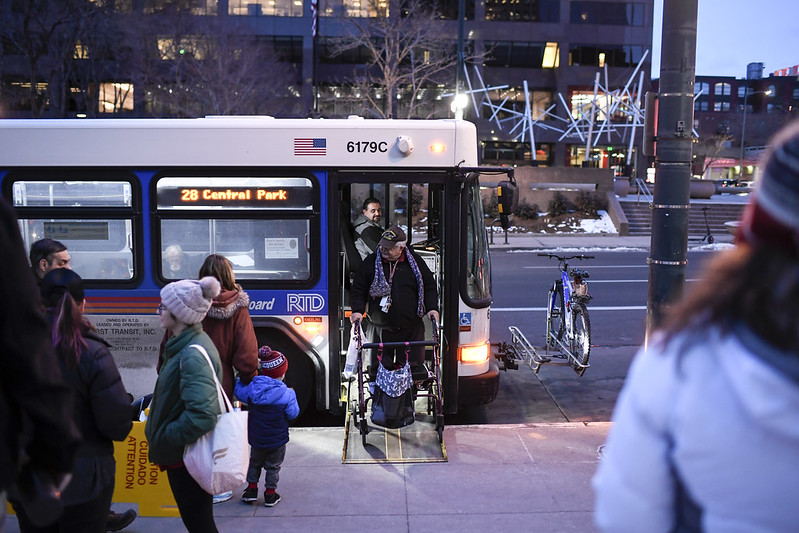Abundant transit unlocks freedom of movement. When we can count on the bus or train, we can easily access jobs, education, medical care, culture, goods and services, and the daily life of their communities. Everyone benefits from greater economic mobility and lower household costs. Transportation systems that maximize people’s access to good transit are necessarily inclusive, without barriers linked to race, income, age, or ability. And because transit is resource-efficient and supports low-emissions neighborhoods, it’s also an indispensable tool to prevent climate change, clean our air, and protect public health.
Whether we know it or not, everyone is affected by public transit. From the air we breathe to ensuring our employees get to work, public transit is essential. It enables families to maintain economic stability, assists employers to hire and retain staff, and offers all of us fresher air to breathe. Yet without swift action and sustained solutions, the COVID-19 pandemic will weaken our transit network and make our car-centric system worse. RTD faces a fiscal crisis that threatens to devastate bus and train service hundreds of thousands of Denver metro residents rely on every day. Only if public officials move quickly to place transit on strong footing can our transportation systems propel the Denver region toward a just, sustainable economic recovery. On Wednesday, December 2, community members and policy makers gathered for Transit is the Future: Denver Transit Justice Forum to discuss Transit Center’s Transit Justice Principles and meeting this moment to deliver better transit for our region.
Read Transit Center’s Transit Justice Principles“In partnership with Mile High Connects, we organized this forum to highlight the critically-important role that transit plays in reconstructing a more just, equitable, and sustainable economy after COVID-19 and beyond,” said Jill Locantore, Executive Director of the Denver Streets Partnership. “Safe and reliable public transportation is the foundation of any vibrant city,” added Deya Zavala, Executive Director of Mile High Connects. “It’s essential that our leaders at every level of government acknowledge that and take appropriate steps to fund and prioritize transit.”
View a recording of the eventThe forum featured a panel of elected officials and area leaders, boasting representation from the federal level to local RTD riders. The panelists agreed unanimously that transit plays a key role in the economic recovery of the Denver metro region and state as a whole.
Framing the conversation, Downtown Denver Partnership President and CEO Tami Door stated that “A successful city is a resilient city, and transit is at the very center of that.”
Similarly; Grace Rink; Executive Director of the Denver Office of Climate Action, Sustainability, and Resiliency; noted on behalf of the City and County of Denver that, “As the largest city in the region, we at the City can develop policies that result in mode shift, air quality improvements, and other benefits that come along with that.”
Shoshana Lew, Executive Director of the Colorado Department of Transportation, pointed out that many transit corridors along main streets are actually state highways, highlighting the need to “re-envision the role that these streets play in our lives.”
Representatives with regional and federal focuses also identified to the importance of properly funding and prioritizing transit, agreeing that access to quality public transportation in the state’s largest metro area supports economic activity across Colorado.
Debra Johnson, new General Manager and CEO of RTD, added similar thoughts, remarking that “Transit has been largely underfunded across the country for decades. The transit problems we’re experiencing aren’t indigenous to Denver.”
Representing the office of Senator Michael Bennet, Grishma Pradhan noted that the federal government “needs to provide the funds to make the visions talked about tonight a reality.”
Boulder County Commissioner and Air Quality Control Commissioner Elise Jones pointed to the importance of transit from a climate and health perspective, noting, “We’re experiencing the effects of climate change in Colorado already. Transportation is the largest source of greenhouse gas emissions in the country and in Colorado; sixty percent of those emissions are from the vehicles we see driving on our highways. We have to reduce VMT and provide an equitable alternative to driving.”
The panel featured representation from transit riders, as well. Gina Jones, a regular transit user, offered the criticality of transit to her livelihood. “I used to be able to take the bus right to the hospital until they stopped that service ,” said Jones. “I’m disabled and I depend on RTD.”
View a recording of the event
